
March 31, 2023
The Pomona alum and scholar-organizer spoke about building internationalist solidarity with the Palestinian cause.
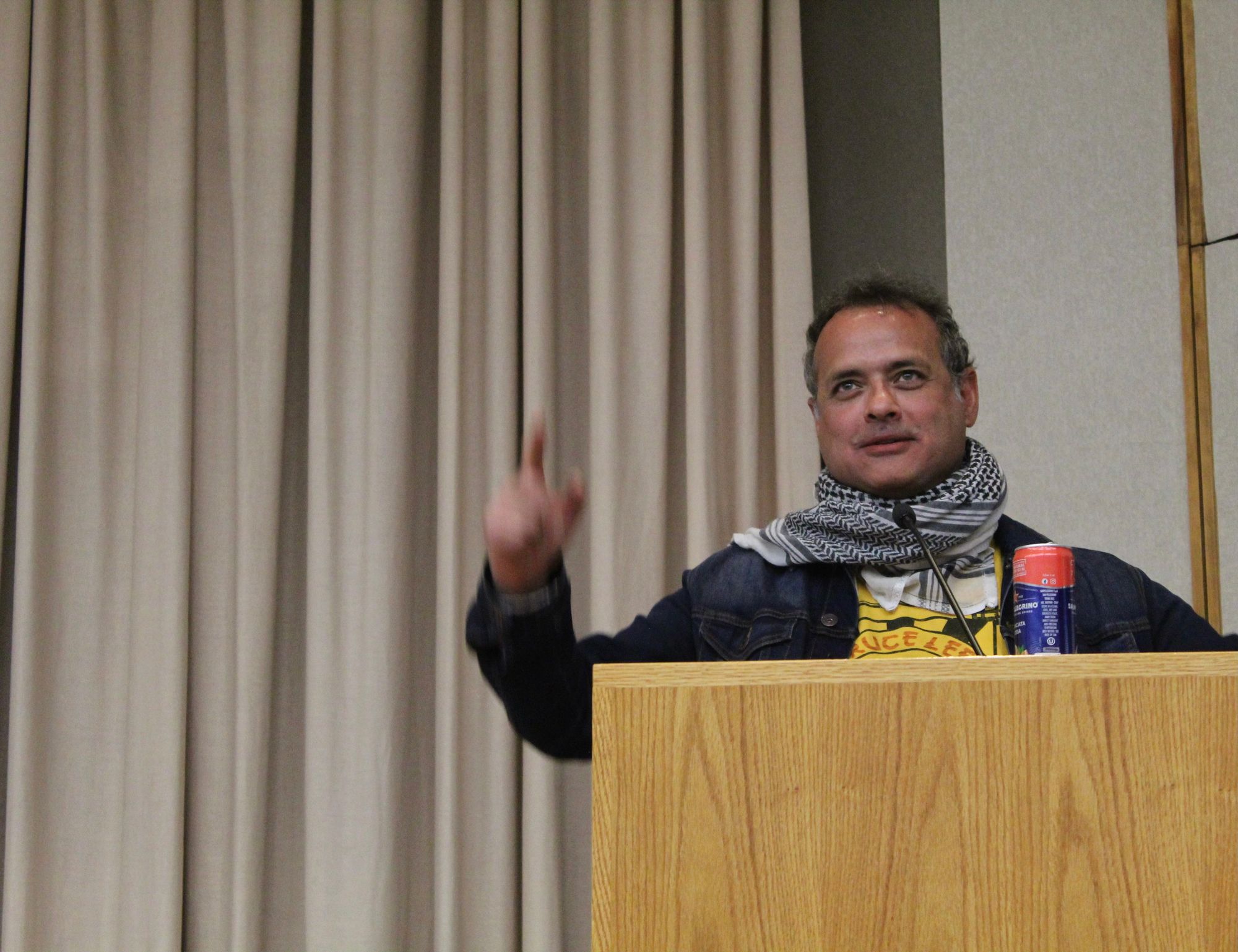
Renowned Marxist historian Vijay Prashad PO ’89 delivered a keynote address titled “Cultivating Internationalist Solidarity” at Scripps on Monday ahead of Claremont Students for Justice in Palestine’s re-launch of their Suspend Pitzer Haifa campaign, kicking off the club’s Palestine Freedom Weeks programming.
Prashad’s talk comes at a critical moment, three months after a far-right Israeli government took power and escalated militarized violence against Palestinians. An organizer-scholar and Claremont alumnus himself, Prashad spoke about the unique difficulty of building student and internationalist solidarity with Palestine, legal-historical understandings of Israeli apartheid and concrete steps students can take to support Palestinians.
Claremont to South Africa: a history of anti-apartheid solidarities
Prashad began his talk by recounting his own development as an organizer, starting when he was a Claremont student.
Prashad recounted working to shelve books at the Honnold library before learning that it was named after William L. Honnold, a donor who “made his money in the most wretched way: by exploiting and oppressing Black workers in South African” mines.
He described how he became passionate about addressing the “crime of apartheid” in South Africa, beginning with Pomona’s investments, after taking a class on African history with Professor Sidney Lemelle.
In February 1983, the Black Student Union mobilized 125 students for a candlelit march protesting the 5C’s investments in apartheid. Coalitions between Students Against Apartheid and BSU expressed common stakes: administrations’ complicity in apartheid South Africa implicated their failure to support Black students in Claremont.
Prashad recalls students escalating from rallies to camping out on then-president David Alexander’s front lawn: “We said, this is a tent city and we will not be moved. So for weeks we slept there. Went to class from there. Did classes on the street under the streetlamp.”

In 1985, Pomona had invested $13,459,810 in banks tied to apartheid South Africa, according to a memo obtained by The Student Life.
Eventually, Pomona divested in 1991. Prashad stressed to the audience that the most meaningful takeaway from this movement’s history, aside from its success, was that it empowered people in his generation to continue the fight well beyond Pomona. Even if you can only mobilize a few people, he said, “a few people might develop a lifetime commitment to struggle through those experiences” organizing.
A hierarchy of sufferings
But despite the success of the anti-apartheid movement, Prashad noted that most students shied away from solidarity with the Palestinian cause.
“Every other cause was possible. But even in 1987, 88, 89, we just couldn’t get momentum to talk about Palestine,” Prashad said.
Thirty years later, a sense of unease about Palestine liberation among self-identified progressive students persists, Jordan James PO ‘24 said. If taken beyond SJP spaces, many ideas in Prashad’s talk “would be taken as controversial and severely attacked,” he said.
Some of this unease comes from sensitivity to the atrocities of the Holocaust and ongoing anti-semitic violence. But Prashad argued that much of this unease is also “severely manufactured,” predicated on privileging European history while erasing non-European genocides.
Prashad referenced Aimé Cesaire’s Discourse on Colonialism, in which the Martinican Caribbean philosopher situated the Nazi Holocaust in the history of European colonial holocausts in the Global South.
While mass killings situated in European history take “added significance,” histories of colonial genocide preceding the Holocaust — “hundreds of millions brutalized and killed” through the trans-Atlantic African slave trade, imperialist wars in Asia, and genocide of Indigenous people in the Americas — remain largely unrecognized in the imperial core, Cesaire argues.
In the 1980s, Palestinian suffering was made irrelevant to Claremont students by the depiction of the “entire people” as “terrorist or subhuman,” Prashad said.
“We have a hierarchy of sufferings where some mean more than others,” he said.
“Language matters”: building internationalist solidarity by naming Israeli apartheid
To combat dismissal of the Palestinian cause, Prashad urged audience members to call out Israeli occupation and apartheid for what they are.
The terms are not moral accusations, fringe left-wing opinions or unique to Palestine, Prashad said. They are drawn from United Nations international law, including a 1967 resolution that advocates “achieving a just settlement of the refugee problem” and names Palestinian territories as “occupied” by “Israel’s armed forces.”
Applying the term “apartheid” to Israel is also a specific legal statement that the Israeli government has created a “differential rights system like Jim Crow in the United States,” Prashad said.
One example is differential access to the right of return. While Jewish people outside Israel have the right to Israeli citizenship, Israeli law bans Palestinian diasporic people from returning to their homelands.
And language matters, Prashad emphasized. Using the word “apartheid” to describe Israel-Palestine enables people to situate it among other histories of apartheid — Jim Crow-era U.S., apartheid South Africa, and a Hindu right-wing government in India currently advocating for a citizenship amendment that would privilege Hindu refugees’ right of return over refugees of other religions — opening possibilities for solidarity in struggle.
SJP Media Coordinator Peter Dien (CMC ‘25) appreciated that Prashad’s perspective relied not on “performative or moralistic rationale” but rather a “material, legal, historical” analysis.
The target has to be BlackRock
Prashad also discussed the link between Israel’s apartheid structure and the recent election of right-wing Prime Minister Benjamin Netanyahu, who has expressed not only anti-Arab racism but also called for banning LGBTQ Pride parades, restricting women’s rights and reducing the ability of Israel’s parliament and Supreme Court to check the Prime Minister’s power, sparking mass protests from liberal Israelis.
While Israeli liberals and civil rights groups have called on the U.S. to intervene, Prashad argued that this far-right “Netanyahuism” was the logical outcome of an apartheid state supported by the U.S, in the first place.
The root of the issue isn’t Zionism, nor even Israel’s political history, but the structure of militarized apartheid occupation, Prashad said — at the heart of which is the U.S.-dominated global weapons industry.
Prashad closed his address with a reminder of the constant violence against Palestinians under Israeli occupation, describing how Amir Abuja was shot in the ribs and the head with American bullets while peacefully protesting, one of 90 Palestinians killed by the Israeli government in the past three months.
“How many of you are 25? You are all under 25. [Abuja] was 25 years old,” Prashad said.
The stakes are grave. What can students do? Prashad encouraged students to join a political organization, build strength in community and confidence in yourself, delegitimize institutions as you create your own, and above all join the international campaign against the arms industry.
Echoing the legacy of 5C Students Against Apartheid, Prashad urged students to pressure the Claremont Colleges to divest from BlackRock and other major hedge funds that sustain the weapons industry.
“If there’s one thing you do, make sure you let your administrations know. No more endowment in companies that invest in weapons. You want to invest in the future, not in death.”

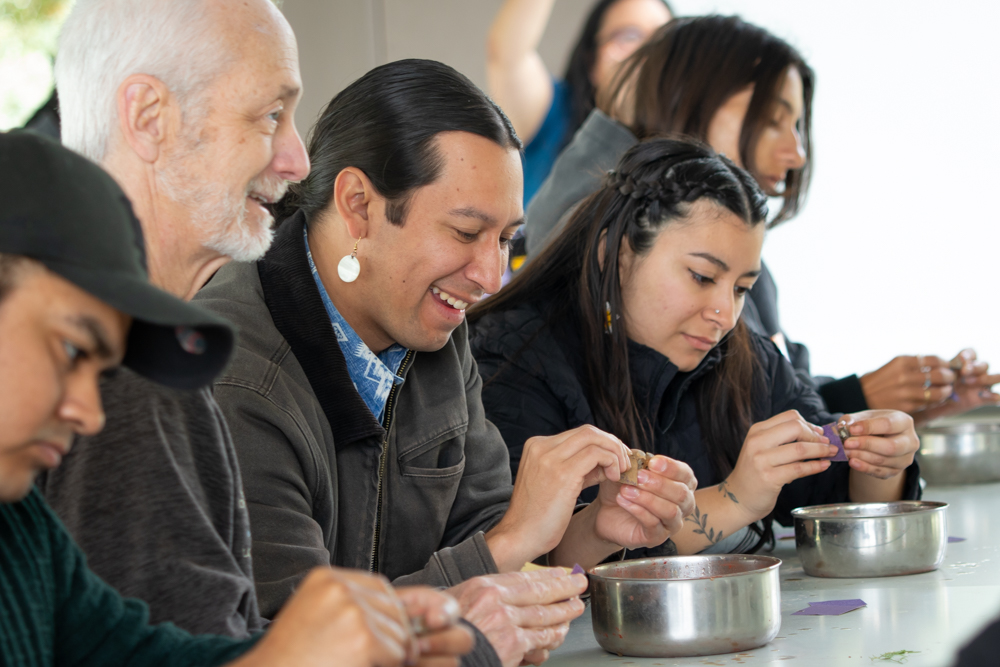
Affinity groups
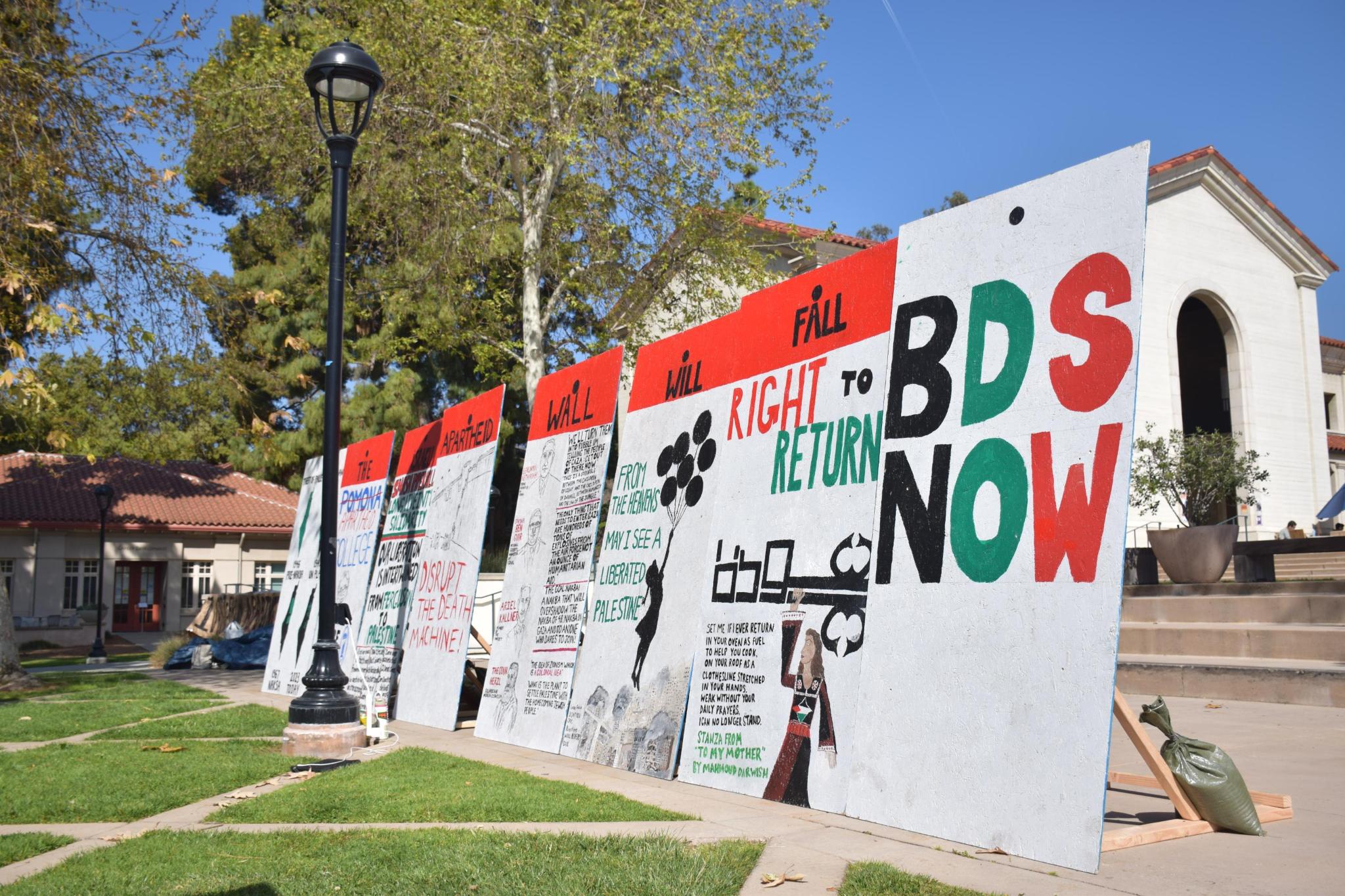
Palestine
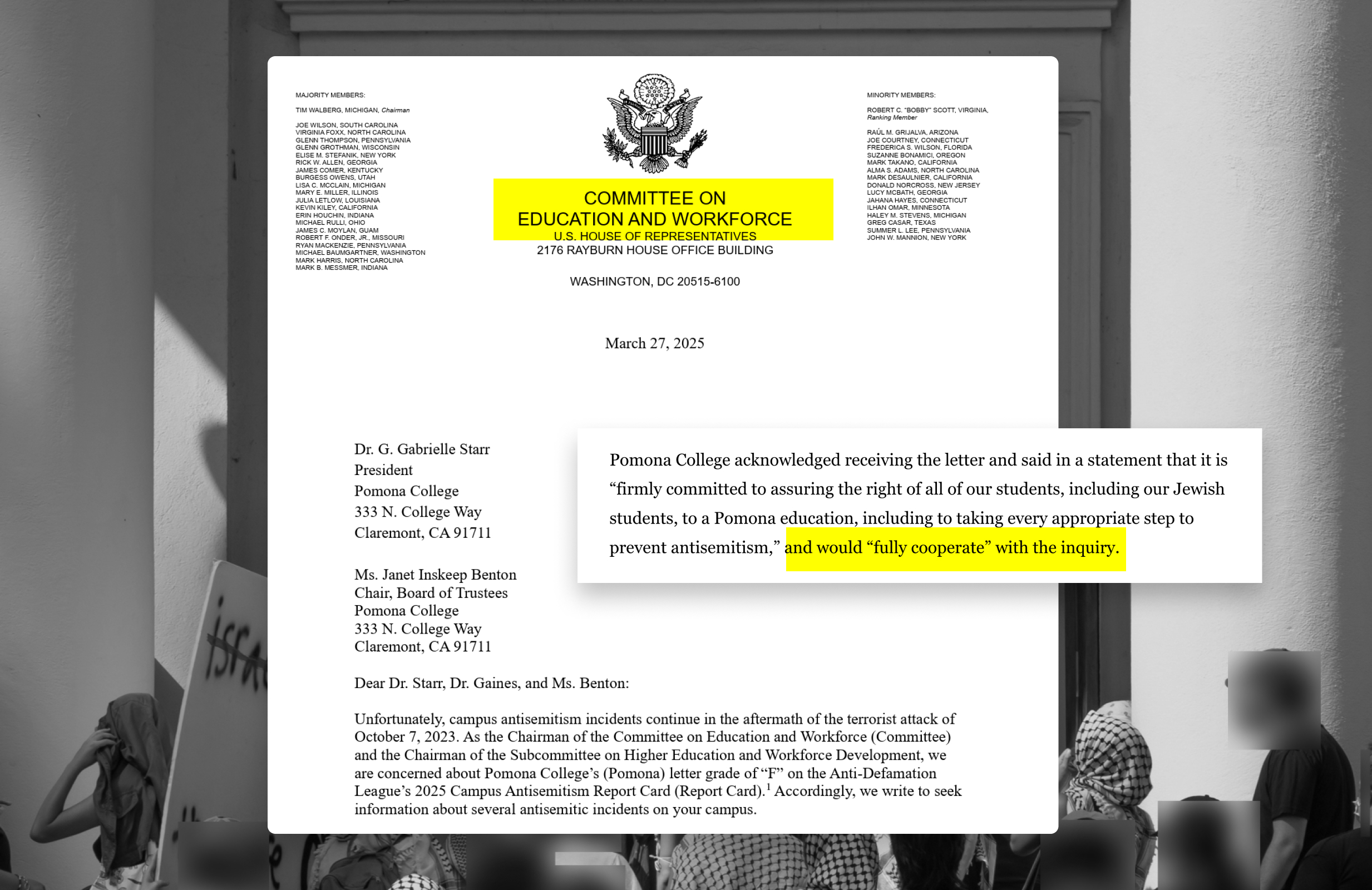
Palestine

Undercurrents reports on labor, Palestine liberation, prison abolition and other community organizing at and around the Claremont Colleges.
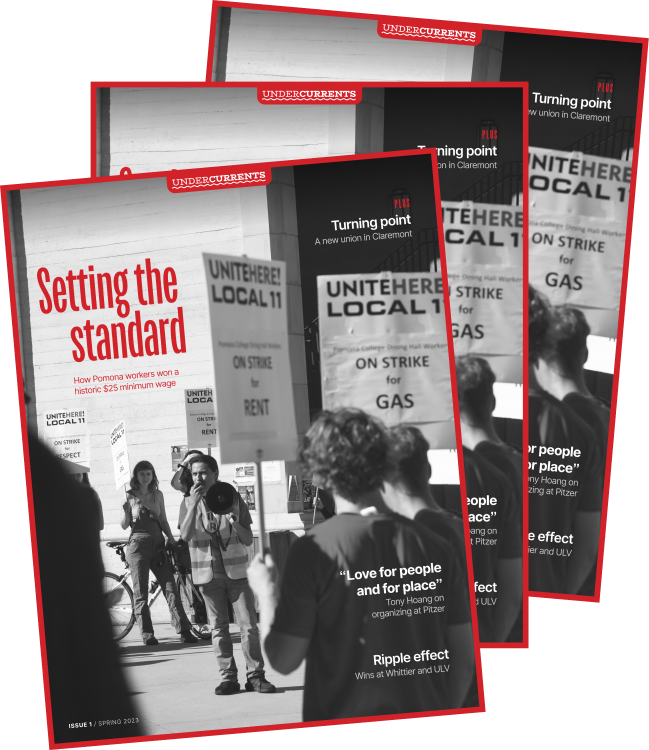
Issue 1 / Spring 2023
Setting the Standard
How Pomona workers won a historic $25 minimum wage; a new union in Claremont; Tony Hoang on organizing
Read issue 1